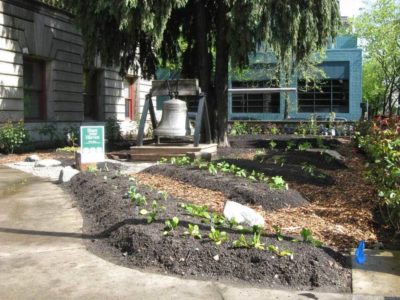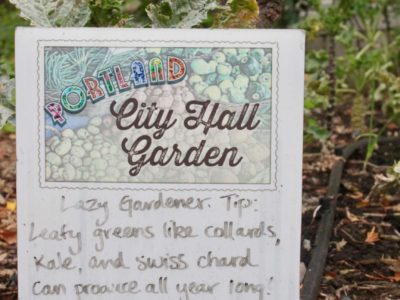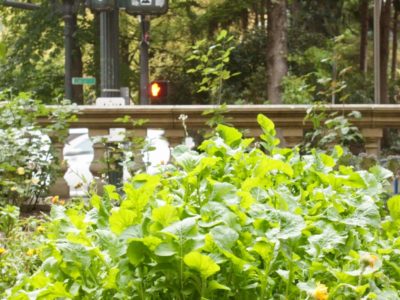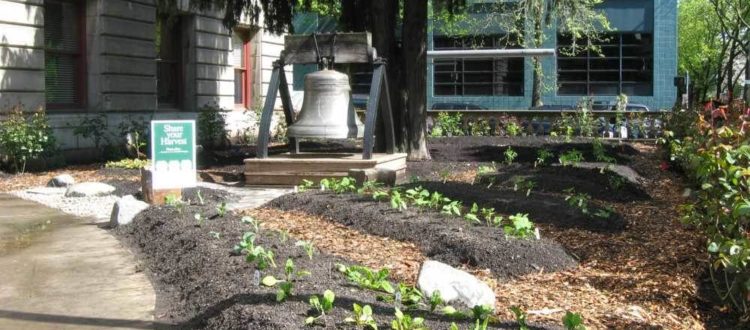Urban Farmer Tends Portland City Hall’s Community Garden
By Deanna Dames, Portland Farmers Market Volunteer
On any given day, thousands of downtown passers-by bustle by Portland’s City Hall, some occasionally stopping for a brief moment to take in the building’s distinctive Italian Renaissance-style architecture.
But if they look closer, they will also find City Hall’s Better Together Garden, a thriving organic garden in the heart of downtown Portland, filled with rows of rainbow chard, kale, arugula, greens, and herbs, surrounded by raspberries, strawberries, and much more.
The Better Together Garden was born in 2009 out of a recommendation by the Portland Multnomah Food Policy Council to establish organic gardens on the City Hall lawn and County headquarters to:
- Inspire residents to plant edible gardens;
- Donate the harvest to hunger relief efforts, and;
- Encourage citizens to plant an extra row in their gardens to donate to those in need.

Better Together Garden after its installation in 2009. Photo courtesy of Portland Multnomah Food Policy Council
On Earth Day 2009, the Portland City Council unanimously approved the Better Together Garden for the north and south lawns at City Hall. Using materials donated by local businesses, a community of volunteers came together to create a 700-square foot garden. Now in its ninth growing season, the garden’s overall mission remains the same: to inspire, encourage, and teach visitors how an abundant produce garden can be achieved in a small urban space.
The garden is currently managed by Genevieve Flanagan, who is also the proprietor of The Urban Acre Homestead and market vendor at Portland’s Lents International Farmers Market.
Beginnings
Flanagan is no stranger to urban gardening on small plots of land. Her farm, The Urban Acre Homestead is just that: an acre lot in NE Portland that is a home and a thriving market garden. The site hosts many perennial fruit and nut trees, herbs, berries, edible flowers, vegetables, and a small flock of egg-laying ducks.
In early 2016, in addition to her own farm, Flanagan was managing the “Garlington Garden” (as it was informally known) for Cascadia Healthcare in East Portland, whose produce went to the nearby Cascadia and NxNE clinics and was made available to their clients on an as-needed basis. When that project began to wind down due to site redevelopment, she turned her knowledge and efforts to the City Hall garden project.
The budget to manage and maintain the garden was extremely limited, affording Flanagan only a few hours a week to steal away from her own urban farm to work on the City Hall project. Nevertheless, though her creativity and success at building relationships with city, community, and local organizations, she’s been able to elevate the awareness of garden’s mission and expand its role for showcasing sustainability and urban garden techniques.
“My objective was to continue the Council’s mission to demonstrate that you can grow all kinds of plants in almost any kind of space, and to continue the evolution of the garden that had been started by its stewards before me,” Flanagan said.
Using her expertise from the Cascadia project and her firsthand knowledge as a farm owner, Flanagan also aimed to introduce new growing techniques into the garden and to bring the garden further into the local community.
Improved irrigation and water use
Until last year, the garden was watered completely by hand. Since Flanagan is only on site a few hours a week, a large amount of water was being wasted due to over-watering, leading to a high percentage of crop loss.
Flanagan and her supervisor worked with Portland Water Bureau, who donated equipment for a drip irrigation system that could run on days that she could not be on hand; improving the overall health and longevity of the crops, and demonstrating how a low-water use garden can thrive with minimal human interaction. \

One of the various urban gardening tip signs that can be found throughout the garden. Photo by Deanna Dames.
Food donations and new types of crops
When the garden was initially established, its produce was donated to a local church with a small kitchen. When the church could no longer handle the donations, Flanagan partnered with OutsideIn, one of Portland’s local aid organizations.
“They have an incredibly imaginative team of chefs. It simply amazes me the meals they are able to cook for their clients out of everything I bring them – healthy, organic, and without wasting any food,” Flanagan said. “And now, we are starting to get direct feedback back from them about what types of produce and herbs they are most in need of, helping to guide some of our strategy for next year’s plantings”.
Providing education and valuable work experience
Flanagan’s relationship with OutsideIn has also brought in small groups of volunteers to help her work in the expanding garden space. The organization, whose mission is to help homeless youth and other marginalized individuals become self-sufficient, became involved with the garden as a vehicle for their clients to gain experience as part of their life skills and work initiative.
Jake Dornblaser, who runs the short-term work experience program at OutsideIn’s Employment & Education Resource Center said the experience has benefitted the organization greatly.
“Our volunteers get the opportunity to learn how to tend to a garden and grow their own food, skills they can use to help obtain or sustain employment. They also can learn the emotional benefits that come from gardening by focusing on a meaningful, sustainable task,” Dornblaser said. “Several youth clients have enjoyed their work there so much that they have gained employment with organizations like the Forestry Service.
OutsideIn volunteers have even started growing vegetable starts at the center, which they bring to the garden for Flanagan to plant. Dornblaser said this has given them the satisfaction of seeing their work brought full circle – bringing food that they helped grow back to the center’s kitchen staff to prepare healthy meals for all the clients.
Garden challenges
As with any public space, the City Hall garden has challenges – from keeping up with garden nuisances like pill bugs, aphids, squirrels, and soil-borne diseases, to shady spaces and big tree roots, to plants being harvested or trampled by the public. Flanagan takes those challenges in stride and says they are just part of managing a public space.
“As a person who values and has fought for public spaces, it’s important not to fixate on things that you cannot control,” she said. “Gardens by nature are a constantly evolving space and imperfections are part of their beauty. It’s just an important for the public to embrace its flaws as well as its beauty.”
Ultimately, she urges people to come visit and look closely, make observations, and learn that it is possible to grow a lot of food on a small amount of land.

City Hall Better Together Garden at the corner of SW 4th and SW Jefferson. Photo by Deanna Dames.
What’s next
As Flanagan and her volunteers begin the process of putting the Better Together Garden to rest for the winter months, she will begin to turn her attention to next Spring’s garden plan: securing plant starts and donations from organizations where she has worked to develop relationships over the last two years, advocating for more funding for its public programs, and the inevitable paperwork that comes with any government role.
Flanagan says she is proud how the garden has grown into an important fixture in our city and as a demonstration garden with unlimited potential.
“The garden is unique from community gardens or any other type of food production space because of the prominence of the location and the fact that the garden is merely an accessory to City Hall, not a part of its purpose or function. The garden belongs to everyone and I hope that the public can enjoy the opportunity it presents and feel some sense of ownership of it.”
As she imagines what the garden’s potential is and what it can do next, Genevieve says that “this is about as exciting as a garden management job can get! It’s an amazing public space with a mission. I am so excited to see how it can keep growing and how more people can interact with it. The sky’s really the limit.”
Visit the Better Together Garden at Portland’s City Hall downtown at 1221 SW 4th Avenue.
You can read more about the Better Together Garden here:
Growing a City Hall Garden https://www.portlandoregon.gov/bps/article/300179
Better Together at City Hall https://www.portlandoregon.gov/bps/article/355608
City Hall Garden Grows Greens and Sows Knowledge https://www.portlandoregon.gov/bps/article/540462
About The Urban Acre Homestead:
Run by proprietor Genevieve Flanagan, The Urban Acre Homestead is just that: an acre lot in Portland that is a home and a thriving market garden. The site hosts many perennial fruit and nut trees, herbs, berries, edible flowers, vegetables, and a small flock of egg-laying ducks.

